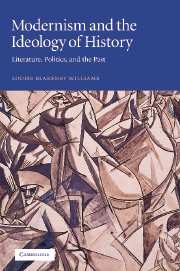Book contents
- Frontmatter
- Contents
- Acknowledgements
- Abbreviations
- Introduction
- 1 “Immaterial pleasure houses”: the initial aesthetic dilemma
- 2 “A more dream-heavy hour”: medievalist and progressive beginnings
- 3 “Pedantry and hysteria”: contemporary political problems
- 4 “A certain discipline”: radical conservative solutions
- 5 “A particularly lively wheel”: cyclic views emerge
- 6 “Our own image”: the example of Asian and non-Western cultures
- 7 In “the grip of the … vortex”: the proof of Post-Impressionist art
- 8 The “cycle dance”: cyclic history arrives
- 9 “The Nightmare” and beyond: the First World War and mature cyclic theories
- Conclusion
- Notes
- Index
6 - “Our own image”: the example of Asian and non-Western cultures
Published online by Cambridge University Press: 22 September 2009
- Frontmatter
- Contents
- Acknowledgements
- Abbreviations
- Introduction
- 1 “Immaterial pleasure houses”: the initial aesthetic dilemma
- 2 “A more dream-heavy hour”: medievalist and progressive beginnings
- 3 “Pedantry and hysteria”: contemporary political problems
- 4 “A certain discipline”: radical conservative solutions
- 5 “A particularly lively wheel”: cyclic views emerge
- 6 “Our own image”: the example of Asian and non-Western cultures
- 7 In “the grip of the … vortex”: the proof of Post-Impressionist art
- 8 The “cycle dance”: cyclic history arrives
- 9 “The Nightmare” and beyond: the First World War and mature cyclic theories
- Conclusion
- Notes
- Index
Summary
A whole people, a whole civilisation, immeasurably strange to us, seems to have been taken up into this imagination; and yet we are not moved because of its strangeness, but because we have met our own image … or heard, perhaps for the first time in literature, our voice as in a dream.
Yeats, “Preface to Gitanjali,” September 1912.“I seem to be getting Orient from all quarters.” When Ezra Pound made this remark in 1913 he was not alone. Many participants of the London art world first were made aware of a variety of products from non-Western cultures at this time. Indian and Japanese poets arrived in the city, amidst much publicity in artistic journals, to give readings of their work and lectures about the arts of their nations. Art exhibits were organized and catalogs written by British critics with the help of a newly hired Asian staff. Numerous books and articles outlining the nature and value of non-Western art forms were published. Clearly “immeasurably strange” civilizations, such as the one referred to by Yeats in the quote above, were attracting much attention.
It is hardly surprising that the five literary Modernists would take note of these “strange” civilizations. They could serve just as well as the Middle Ages for an escape from the ugly philistinism of the modern world. However, by 1912, as is clear in the quote heading this chapter, a different attitude had emerged among the Modernists.
- Type
- Chapter
- Information
- Modernism and the Ideology of HistoryLiterature, Politics, and the Past, pp. 114 - 137Publisher: Cambridge University PressPrint publication year: 2002



